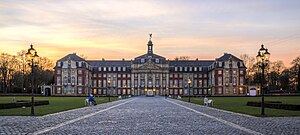Münster University
| Westfälische Wilhelms-Universität Münster | |

The Schloss: administrative centre and the symbol of the university.
|
|
| Latin: Universitas Monasteriensis | |
| Motto | wissen.leben (German) |
|---|---|
|
Motto in English
|
living.knowledge |
| Type | Public |
| Established | April 16, 1780 |
| Budget | € 628,7 million (2015) |
| Chancellor | Matthias Schwarte |
| Rector | Johannes Wessels[] |
|
Administrative staff
|
7,850 (As of 2016[update]), including 593 professors |
| Students | 43,790 (As of 2016[update]) |
| Location | Münster, NRW, Germany |
| Campus | Urban, 285 buildings (2003), yearly expenses ~ 559 million Euro |
| Colors | RAL 9004 & RAL 5021 |
| Website | www |
 |
|
| University rankings | |
|---|---|
| Global | |
| ARWU | 101-150 |
| Times | 125 |
| QS | 294 |
The University of Münster (German: Westfälische Wilhelms-Universität Münster, WWU) is a public university located in the city of Münster, North Rhine-Westphalia in Germany.
With more than 43,000 students and over 120 fields of study in 15 departments, it is Germany's fifth largest university and one of the foremost centers of German intellectual life. The university offers a wide range of subjects across the sciences, social sciences and the humanities. Several courses are also taught in English, including PhD programmes as well as postgraduate courses in geoinformatics, geospational technologies or information systems.
Professors and former students have won ten Leibniz Prizes, the most prestigious as well as the best-funded prize in Europe, and one Fields Medal. The WWU has also been successful in the German government's Excellence Initiative.
The university has its roots in the Münster's Jesuit College (Jesuiten-Kolleg Münster), founded in 1588, and the convent of lay sisters Liebfrauen-Überwasser, founded in 1040, of which it took its seal. The convent was dissolved in 1773, so that its funds could be used to found the University of Münster on 16 April 1780.
In 1631, Pope Urban VII and Emperor Ferdinand II issued privileges, allowing the establishment of a university in Münster. However, due to a lack of funding, they were only put to use in 1780, when the modern University of Münster was founded with four faculties: Law, Medicine, Philosophy and Theology.
In 1843, it was renamed to Royal Theological and Philosophical Academy (Königliche Theologische und Philosophische Akademie), informally Münster Academy (Akademie Münster).
The ceremony of constitution was performed by Franz Freiherr von Fürstenberg. The university received its current name from Emperor Wilhelm II on 22 August 1907.
...
Wikipedia
